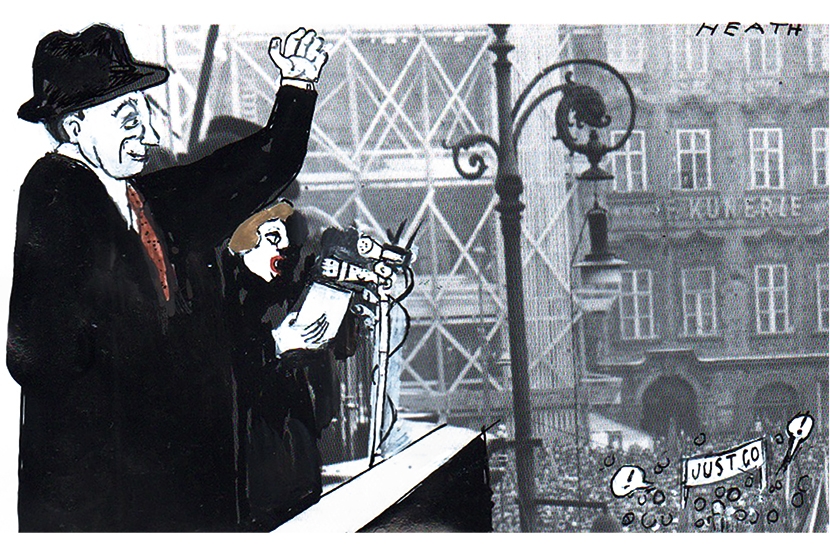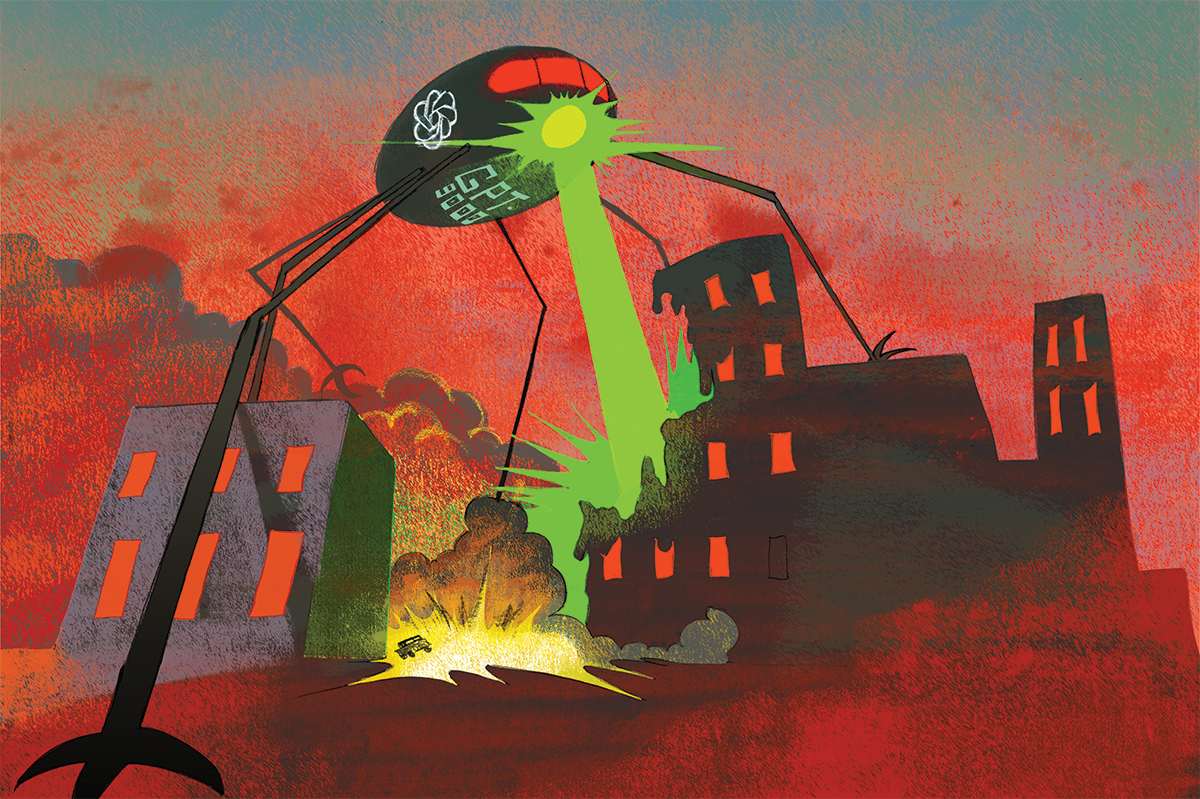Emily Maitlis
Six years ago I took my son, Milo, to Bucharest for his birthday. In the baking July sun, seeking shade, we crouched on the kerb in front of the presidential palace. And I played him the footage of the crowds on that bitter December morning of 1989 as Nicolae Ceausescu and his wife Elena emerged on to the balcony. The speech Ceausescu gave, or tried to give, on December 21 was his last. And it was extraordinary. Ceausescu used his balcony address to reassure, cajole, bribe the crowd. But it turned against him as he stood there. This footage — state TV rolling live at the time — became the physical, televisual embodiment of power seeping away from a president. The leaders and their bodyguards are above them, removed. But it is those on the ground who now control the narrative that will end his days. We watch Ceausescu’s face as it begins to understand that. He and his wife tried to flee the next morning but they were caught, ‘tried’ for genocide and subversion of state power and executed by firing squad four days later on Christmas Day. It is mesmerizing for a political journalist to see how easily and how quickly power can be lost.
Alec Baldwin
I suppose the pandemic of 1918 is the first thing that comes to mind. However, the period of history that I’m most focused on now is the Depression from 1929-1939. I believe that decade taught us what it was like for Americans to fail to recognize their priorities and to believe in an economic growth that largely benefits Wall Street and ignores Main Street. An America that does not recognize a healthy middle class and working class is doomed to repeat the lessons we might have learned from the 1930s.
Stuart Rose
No moment in recent history is more important than Brexit. The die is cast — the decision is made. The difference between success and failure is, however, too great to contemplate. How we tackle the transition and manage the changes necessary is critical to Britain’s future in the world. Time is not on our side. Brexit is upon us and if it is the success it must be, we must have a clear plan, faultless execution, relentless determination, and clear and open communication. Brexit is the key moment in our history. How we handle it and learn from it will be for future generations to judge.
Antonia Fraser
I have always been fascinated by the events of the so-called Flight to Varennes of June 20/21 1791 whereby Louis XVI and Marie Antoinette did — or did not — attempt to flee France. A special traveling coach known as a berlin was ordered which was not recognizably royal. In the middle of the night King, Queen, their two children, the King’s sister and a lady-in-waiting crept away in rough disguise and under cover of darkness. Their ostensible aim was a town close to the border of the Austrian Empire, ruled over by the Queen’s brother the Emperor Leopold, where it was hoped counter-revolutionary troops would support the King. A series of chances, including the recognition of the King’s face, led to their being halted at Varennes, a small town on the river Aire. The next day a deputation of the National Assembly arrived and obliged them to return to Paris — and captivity.
Why didn’t Louis XVI flee while he had the chance, with the help of loyal troops, cross the Austrian border and throw himself on the mercy of his brother-in-law the Emperor? Marie Antoinette would have been up for it. The answer is in the essentially decent, essentially weak character of Louis XVI himself: he could not bear to be seen abandoning his country. So Louis unwittingly condemned himself and his wife to public execution, and his little son to death in prison. If only they had made a dash for it from Varennes!
Griff Rhys Jones
In 1917, Arthur Ransome was covering the Russian Revolution for the Guardian. In a letter to his mother, he wrote that he was at a tea party when a mob gathered nearby at Kresty prison in St Petersburg. There were soldiers amongst that crowd and, echoing the Bastille, they got inside, freed the political prisoners and burnt the records. It was a footnote to the annals of violent dissent. But the instant that lodges with me is that the other guests at Ransome’s tea party ignored his urgings to go, and watched him hurry away with a puzzled bemusement. They were successful, middle-class people. They had a telephone in the hall, a fire in the grate, modern art on the walls, secure jobs, clever children and a crumpet nearly done. Many of the middle class in St Petersburg lacked any grasp of the extremities that were about to engulf them until the Bolsheviks closed their bank accounts and took their money. I’m not saying they were stupid, or cowardly, or could have stopped it; only that seismic events happen when you are helping yourself to another piece of cake.
Peter Hitchens
I often wish I had been at Placentia Bay, Newfoundland, in August 1941, for the great and totally misunderstood meeting between Franklin D. Roosevelt and Winston Churchill. It was majestic, with great ships and great men gathered in a peaceful haven in the midst of world war. It was moving: imagine the ships’ companies of the British battleship HMS Prince of Wales and the American cruiser USS Augusta together singing ‘For Those in Peril on the Sea’ and joining in ancient prayers common to both civilizations, and the sound of them echoing across the water.
But it was in fact the moment at which the long struggle for mastery between Britain and the USA ended with the Americans in charge. There never was an ‘Atlantic Charter’.The phrase was invented by the Daily Herald. The scrappy document involved foretold and prescribed the end of the British Empire and formalized the end of British naval supremacy. The meeting itself was a flop in which Churchill failed to get Roosevelt to come into the war. The backdrop was highly symbolic of the new age — a US naval base on formerly British land recently extracted by Washington in return for 50 prehistoric destroyers.
A few months later HMS Prince of Wales would be at the bottom of the sea, sunk by the Japanese. And Britain, broke and supplicant, would be reduced to the status of mere ally of the USA and the USSR in a war she had begun but could not afford to finish on her own. But even now it is unpopular to say so.
Maureen Lipman
As a student of A-level history, I was rooted to the spot when our dynamic history teacher Mr Attwood — tall, bespectacled, three-piece tweeds — talked us through the Dreyfus affair. My sense of injustice was aroused. This felt personal. How dare the nationalist Catholic majority in France accuse Captain Dreyfus of treason? They used this distinguished soldier as a scapegoat, fueling anti-Semitism, ruining his career and sentencing him to life imprisonment on Devil’s Island in French Guiana. The affair split the third French Republic for 12 years, Mr Attwood told us dramatically, and remains one of the great miscarriages of justice and government scandals in history. I was riveted. I stopped doodling for 45 minutes and took copious notes. History? This wasn’t history, this was now! Though General Esterhazy was the actual culprit, subsequently, incredibly, Dreyfus was found guilty again at a further trial, and sentenced to extended imprisonment on Devil’s Island — extended on top of life, that is. Dreyfus was finally pardoned, said Mr Attwood kindly, and allowed to rejoin the army and go on to have a distinguished record of service in the first world war. At which point I grew apoplectic and terribly affronted. Why would Captain Dreyfus think of fighting for a country which had so humiliated and persecuted him?
Dreyfus got me an A at A-level, but it was not until Roman Polanski’s film An Officer and a Spy that I realized my outrage was quite so justified.
Brenda Hale
It’s selfish, I know, but the moment in history that matters the most to me is December 23 1919, when the Sex Disqualification (Removal) Act 1919 received the Royal Assent and came into force. Helena Normanton was admitted to the Middle Temple the very next day. This was a victory for the pioneers who had been spurned by the legal profession on the ground that women were not ‘persons’ in the eyes of the law: not because the word ‘persons’ could not include women but because it had never done so before. Among them was Christabel Pankhurst, who graduated with first class honors in law from the University of Manchester but was rejected by Lincoln’s Inn in 1904. She went on to play a prominent part in another great landmark in women’s history, the Representation of the People Act 1918, which gave some women the right to vote for Members of Parliament. But it was the 1919 Act which meant that I could read Law at Cambridge University with a view to qualifying as a barrister and even aspire to become a judge. Without it, I would not have had the life which I have had.
Dominic Cummings
In the early morning of September 26 1983, Stanislav Petrov of the Soviet Union’s Air Defense Force was on duty, monitoring his country’s satellite system, when the siren sounded. His computer indicated that the US had just launched five nuclear-armed intercontinental ballistic missiles, and protocol required him to notify superiors immediately. Soviet strategy was to ‘launch on warning’, and many in Moscow believed Ronald Reagan was planning a first strike. But Petrov had a gut feeling this was a false alarm. Five missiles seemed too few, and the system itself was new. He did not inform superiors and within a few minutes it became clear that he had been right. Much of the world could have been destroyed within an hour if Petrov had followed protocol. It was only because of his intensive training and quick wits that many millions of lives weren’t lost. Afterwards, he was reprimanded for failure to do his post-event paperwork properly.
We have fluked many similar episodes since the 1960s. ‘Launch on warning’ protocols combined with flawed early warning systems remain a huge danger today. Nuclear and biological weapons are proliferating. Issues of existential importance are largely ignored and our political systems incentivize politicians to focus more on Twitter and gossip-column stories about their dogs. In Britain parts of the nuclear enterprise have rotted from years of neglect, though thankfully the new cabinet secretary knows and cares and is acting to remedy this. In America and Russia security disasters are routine. As COVID has shown, far greater intellectual and material resources ought to be deployed on such apparently low-probability, high-impact events.
Justin Webb
A gloomy January day in the Canadian city of Toronto. The year is 1922 and a 14-year-old boy called Leonard Thompson is lying in the hospital. Leonard weighs under five stone. He has been on a starvation diet to try to keep his death at bay but he is close now to the end. Every Type 1 diabetic in human history has so far faced the same death; with no working pancreas they faded away, their bodies unable to cope with the processing of food. But on January 11 of that year Leonard was selected for a lone experiment. He was injected with ‘a murky, light-brown liquid containing much sediment, which dissolved to a considerable extent on being warmed’. It was insulin, discovered and refined by two doctors, Frederick Banting and Charles Best. Actually, not much refined: the first injection seemed to do no good and left a lesion on the boy’s skin. But a few days later, they tried with a more purified version. Leonard was feeling better within minutes. Days later he left hospital. He lived for another 13 years. Millions since have lived on as a result. Of course, there are other medical wonders — the coronavirus vaccines among them — that change the course of human history. But my son Sam would not be alive and at university without Banting and Best. Henry Slade would not be gliding across try lines for England. Theresa May, a late comer to Type 1, would have faded too. Medical history is the best sort. These are Trafalgars for the whole human race.
Robert Winston
Is the airplane the most dangerous technology we’ve invented? Not because of bombs, climate change or crashes on cities, but because of how quickly a virus can spread around the globe. Daniel Defoe’s A Journal of The Plague Year was published in 1722. Defoe was only five during London’s Great Plague but his verifiable narrative described its transport on Dutch shipping, recording his mathematical analysis predicting the spread of disease. He stated the need for self-isolation and how youths in pubs ignored social distancing. Infected people were confined for 40 days — hence ‘quarantine’.
Modern scientists suggest COVID is unique, as people are infectious days before they have symptoms. But 300 years ago, Defoe described something similar. Streets became deserted, parliament shut down and the central government was useless. The poor suffered most, but the Lord Mayor and local government provided essential support, including food. Quacks offered expensive, hopeless cures (no mention of bleach), there was rising mental ill-health and the bravery of nurses was remarkable. Defoe described the lingering, painful death of bubonic plague — but pneumonic plague, perhaps a new mutation, killed within hours. The main wave finished with more than 100,000 deaths (possibly one third of London’s population). Meantime, those who were well off continued protesting about the economy. Was it ever thus?
Jonathan Sumption
The Paris Peace Conference of 1919-20 was where the modern world went wrong. The consequences of France’s vindictive determination to marginalize Germany are well known, and were denounced at the time by John Maynard Keynes in one of the most biting political pamphlets ever written. It took 30 years to undo its effects.
The dismantling of the Ottoman Empire in the Near East by comparison was an authentically British mess, less well known, whose consequences are still with us. At the end of the Great War, Britain dominated the region, militarily and politically. It could do more or less what it wanted. What did it do? It promised large parts of Turkish Anatolia and Thrace to Greece to satisfy the philhellenism of Lloyd George. The result was to sow the seeds of the current hostility between Greeks and Turks, who had lived together in peace for eight centuries.
It created mandatory regimes for Britain and France in the Levant, which were the origin of most of the current problems of the region. The Arabs, to whom Britain had made vast promises during the war, were betrayed and left to fight it out over the remainder.
It created an inherently unstable new state of Iraq out of a combination of three minorities, ostensibly controlled by the Sunni Arabs, actually by Britain. The Kurds were divided between three states, most of them being lumped in with Iraq to satisfy British designs on the oil reserves of Mosul.It left Iran bruised by and resentful of years of British military occupation and economic exploitation which continued until the 1950s.
The British High Commissioner in Constantinople minuted at the time that all this ‘would perpetuate bloodshed indefinitely in the Near East’. And so it has proved.
Andrew Doyle
The Synodus Horrenda of January 897 is one of many bleak episodes in history that the Catholic Church would probably rather we forget. This is when Pope Formosus was put on trial for perjury and violating canon law. The twist is that by this point he had been dead for eight months. The trial was an exercise in score-settling by his successor, Stephen VI. He had the corpse exhumed, dressed in his sacerdotal garb and propped up in the papal court. Pope Formosus was even provided with a defense council, but the outcome was never really in doubt. After hours of interrogation, during which Pope Stephen hurled abuse at the cadaver and tauntingly challenged it to reply, a guilty verdict was reached. The body was stripped, mutilated and thrown into the River Tiber.
I’ve come to think of this story as the ninth-century ecclesiastical version of today’s ‘cancel culture’, a process by which social justice activists trawl for past deeds and statements that might discredit both the living and the dead.
Anthony Seldon
Monday May 8 1995, the 50th anniversary of VE day, is etched into my memory for ever. It was the old century. The Queen Mother, the Queen and Princess Margaret came out on to the balcony at Buckingham Palace, as they had done 50 years before with George VI, the guns across Europe at last quiet. Vera Lynn was alive and singing lustily about the white cliffs of Dover to the crowds swirling around the royal parks, as they had done 50 years before.
That afternoon, we took our three young children to our local fete and street party in Walberswick, the darling village on the Suffolk coast, and looked up to see the World War Two RAF fly-past gathering in the skies above, before turning south in procession to fly above the Mall. That evening, back in London, we stood on the balcony in our house in Sundridge Park, looking at the fireworks rising above the houses, while the children asked questions about what it all meant. Then we listened to a discussion on BBC Radio 4, when three historians and I spoke about learning the lessons of World War Two, and how we would never again let divisive nationalists influence history. I was never prouder to be British than on that far-off day. How naive it all seems now.
Andrew Adonis
‘Happily there seems to be no reason why we should be anything more than spectators,’ wrote H.H. Asquith to his lover Venetia Stanley on July 24 1914. He was referring to the mounting tension between the European powers following the assassination of Archduke Franz Ferdinand in Sarajevo on June 28. It took just 11 days for maybe the greatest U-turn in history. On August 4, Britain declared war on Germany and the entire course of the 20th century changed.
World War One was a leap in the dark by the sybaritic Asquith and his prevaricating foreign secretary Sir Edward Grey. Bloody conflict ensued for four terrible years. By 1918 Europe was transformed fundamentally, and fundamentally for the worse. The Russian Revolution of 1917 created Lenin and Stalin. The Treaty of Versailles, dubbed by Keynes a Carthaginian peace, led to Hitler and the Nazi revolution, then on to the second world war.
We can’t know how history might have turned out if Asquith and Grey had stopped the march to war in 1914. But the alternative could hardly have been worse. Ernest Bevin, the great post-1945 foreign secretary who kept Stalin out of western Europe, believed Liberal weakness was the prime cause of the 1914 catastrophe. In my new biography of Bevin I cite his shrewd remark: ‘The Liberals of that day never made themselves clear. They let this country drift on until we were in it and then they used propaganda to prove it was a righteous cause.’
Joan Bakewell
While incompetent military leaders were making a mess of the Crimean war, two women made a breakthrough. Florence Nightingale realized more men were dying from disease than from wounds. Infections were causing typhoid, cholera, dysentery. She took steps for cleanliness and sanitation that laid the bedrock of public health. Meanwhile Mary Seacole, fighting prejudice and snobbery, was bringing nursing and comfort to soldiers behind the lines. Pioneers in different ways for the role of women.
Mick Hucknall
The release of the ‘Penny Lane’ and ‘Strawberry Fields Forever’ double A-side by the Beatles was a major landmark in 20th-century music. The extraordinary originality of the recordings, compounded with beautiful and ground-breaking ‘videos’, made its release a major cultural event.
Growing up in 1960s east Manchester, the Beatles were my life musically speaking. This moment represents high art: peak Beatles. Singles were the primary source of consumption at that time, which is perhaps why its release had more of an impact on me than that of Sgt. Pepper’s Lonely Hearts Club Band. I’ve long thought the Beatles’ magic lies in the sum of their parts: brilliant musicianship, production and engineering; the specificity of their personalities; two genius composers; beautiful singing; and one supremely sensitive drummer who focused on enhancing the songs rather than merely playing a beat.
I was seven when I first heard these songs and I was mesmerized. They remain timeless. The wonderfully evocative lyrics and intricate melodies of ‘Penny Lane’ contrast with the more psychedelic and darker ‘Strawberry Fields’ — and echo the differences between the Lennon and McCartney characters. ‘Strawberry Fields’ remains one of the most evocative recordings in history. Unmatched in its originality, it’s Lennon at his most brilliant.
So much has obviously been written about the Beatles, and their impact on broader society can never be overestimated. I feel so honored to be part of the generation that grew up under their glorious umbrella. For as long as we have civilization, the Beatles are set to remain a significant part of our lives.
Jung Chang
My highlight of history would be the first 16 years of the Chinese Republic — 1912 to 1928 — when China was a vibrant democracy. This fact is generally unknown to the world, and I came to appreciate it fully only while researching my last two books, one on Empress Dowager Cixi, and the other on the three Soong sisters from Shanghai. The democratization process began with Cixi in the first decade of the 20th century, when she resolved to turn China into a constitutional monarchy. After her death, the Republic that came into being in 1912 put democracy into practice. Elections, however imperfect, were held, and a parliament functioned. Free speech, including a free press, thrived. So did the activities of different political parties. An independent legal system was working. A dynamic middle class emerged, and a host of literary and artistic giants flowered. Creativity was at a height unsurpassed to this day. Women’s liberation, which had started with Cixi, gathered stunning pace. In spite of the multitude of problems at the time, this was the golden era of 20th-century China.
This period of immense new freedoms and possibilities ended as Chiang Kai-shek overthrew the democratic government in 1928 with a military force that had been built by Soviet Russia. Moscow enabled Chiang to become the first dictator of modern China and, as he turned out to be anti-communist, Stalin backed Mao, who toppled Chiang and went on to build a totalitarian communist regime. It was the propaganda machines of Chiang and Mao that branded democratic China as a failed state.
The existence of those 16 years before dictatorship was imposed through the barrel of the gun gives the lie to the assertion that China has no democratic tradition and is not suited to the system. The fact is that democracy once worked there.
Tom Holland
The first person in history whose name we know was not a conqueror, not a king, not a priest, but an accountant. Some time in the late 4th millennium BC, in the Mesopotamian city of Uruk, a man called Kushim recorded a business deal: ‘29,086 measures barley. 37 months.’ Then he signed it off. Already, at the start of recorded history, cities were dependent for their functioning on a ready supply of food, and the ready supply of food depended on bureaucrats. MI5, when it assesses the threat levels to strategic installations, operates on the assumption that Britain is ‘four meals away from anarchy’. It is doubtful that this would have come as news to Kushim. He and all the bureaucrats of Uruk would have been perfectly familiar with what has always been an iron law of history. For more than 5,000 years now, civilization has marched on its stomach.
Helena Morrissey
The Global Financial Crisis of 2007/8 — both because it epitomized our human tendencies to greed and hubris and because the policy response sowed the seeds of widespread populism. Greed, hubris and groupthink are perennial failings, swelled to epic and disastrous proportions in the run-up to the crisis. As Citibank’s then-CEO Chuck Prince infamously said a year before Lehman’s collapse, ‘while the music’s playing, you’ve got to keep dancing’. No one wanted to call ‘stop’ — until it was far too late. But just as significantly, the actions taken to shore up the financial system — in particular via quantitative easing (an ‘emergency’ measure in 2008 that still continues, pumping billions into financial markets) catalyzed a legitimate populist reaction. That policy response favored capital over labor, widening the wealth gap as asset prices rose while wages froze. I’ll never forget the sheer panic that swept through the City as it became clear that the financial system was perilously close to collapse, as one storied institution after another either failed or was bailed out, as the ‘Masters of the Universe’ stared into the abyss…and yet within a year, their music was playing once again and few paid any price. The losses were borne by the nation, the gains went to the metropolis. What happened next in politics should really have been no surprise. Yet today, there’s no real evidence that policymakers learned the basic lessons: that people want to see clearly that there’s one rule for everyone, that those who take advantage will be punished while those who work hard and honestly will be rewarded.
***
Get a print and digital subscription to The Spectator.
Try a month free, then just $7.99 a month
***
Hartwig Fischer
The British Museum was founded by parliament on June 7 1753, at the height of the European Enlightenment, as an independent charitable trust, the oldest and greatest publicly funded museum. It comprised natural history (today in the Natural History Museum), a library (today the British Library), and the history of humankind (the British Museum today). The collection was to represent the world. It was to be kept together for ever, to be openly accessible for people from all nations, to be explored through innovative research bringing together different disciplines to compare cultures across the millennia and to understand our common humanity. The knowledge thus generated was to be widely shared to benefit the public: the museum was not only about objects and the experience, knowledge and stories they preserve but just as much about relationships and exchange between human beings from all walks of life.
The British Museum was founded when Britain was already a significant power with colonial possessions across the world. This context is obviously important to the history and character of the institution and needs to be explored and elucidated by successive generations. But the museum was not established as an arm of the state to celebrate British imperial power. Parliament vested responsibility for the institution in the trustees. The trustees have fiduciary ownership of the collection; they are owners inasmuch as they act on behalf of the entirety of its beneficiaries, and these beneficiaries are the citizens of the world, and future generations.
This is a unique set-up: it has created an unrivaled tool to study and explore the history of humankind through significant objects, from first beginnings until the present day.
This article was originally published in The Spectator’s UK magazine. Subscribe to the US edition here.

























